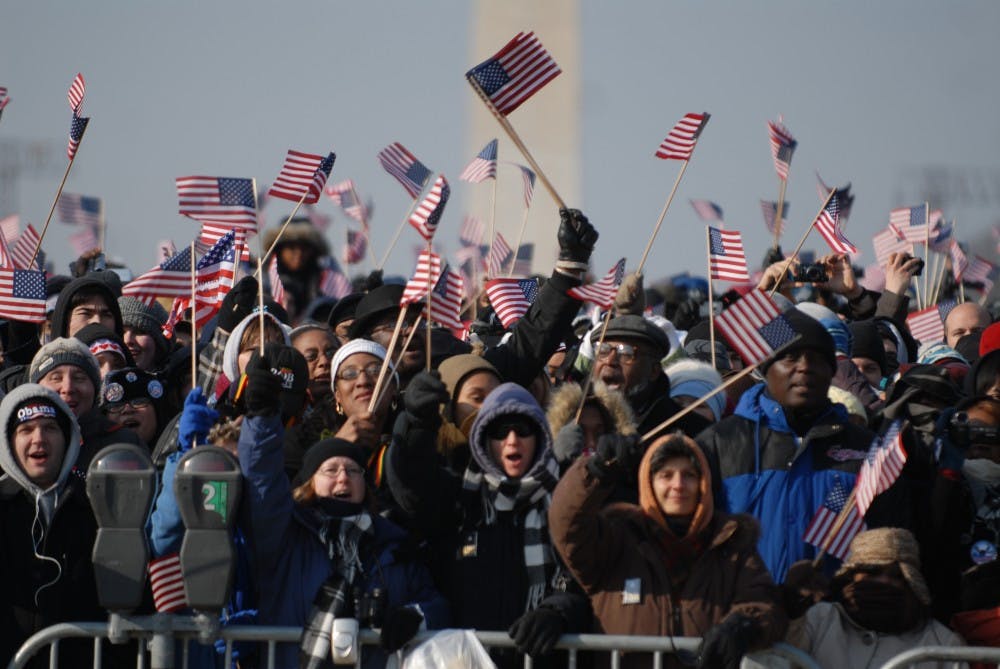
Looking ahead to Monday’s inauguration, President Barack Obama may have a tough act to follow: himself.
Across the country and on Penn’s campus, many have noted that the mood surrounding Obama’s second inaugural go-around has featured a clear drop in enthusiasm from the high point in January 2009.
“Second-term inaugurals are always very different,” said English professor Dick Polman, a political blogger for WHYY and former Philadelphia Inquirer political columnist. “The first time around, presidents are looking with great sweep across a great horizon of possibilities. But the second time, they’re a bit more tempered by experience — they’re likely to pull in their parameters a bit to stick to what’s achievable.”
Following Obama’s election in November 2008, Penn’s campus was “as loud as it’s ever been,” said 2011 College graduate Hannah Connor, who campaigned for Obama’s first election with Penn Democrats.
After learning of Obama’s victory on election night, Connor — along with thousands of other students and Philadelphia residents — marched down Walnut and Market streets to City Hall for an impromptu midnight victory celebration. Two months later, Connor was also among the hundreds of Penn undergraduates who traveled to Washington, D.C., for the inaugural ceremony.
“I remember four years ago that there was so much excitement, so much hope,” she said. “It was like nothing I’d ever seen.”
However, tempered largely by a stalling economy and a divided Congress, much of that euphoria now seems to have dissipated.
A drop in the number of inaugural balls this year and a reported shortfall in inauguration fundraising are both additional signs of the waning grandeur of this year’s ceremonies.
“We’re now facing challenging economic times, and there’s a natural tendency for a second-term inaugural like this to be lower key and more subdued than the first,” said 2001 Engineering graduate Theo LeCompte, who, in addition to working on the 2009 inauguration, is serving as director of events and ceremonies for this year’s Presidential Inaugural Committee. “But that doesn’t change the fact that there are many folks out there who are still very excited for Monday.”
This year, Penn Democrats offered 56 spots to the student body on a bus that will leave early Monday morning for the inauguration, College sophomore and Penn Democrats President Matt Kalmans said. All of the spots sold out the day they went on sale.
This, Kalmans believes, is a testament to the fact that, while the atmosphere surrounding Obama’s second swearing-in may be different, there are still high levels of enthusiasm and anticipation.
Kalmans added that this weekend’s inauguration may be even more significant in some respects than in 2009, given that “all the odds were stacked against the president” when the election began.
Although it is likely that more students attended the inauguration in 2009 — some on a bus paid for by the Office of the Vice Provost for University Life — than will this year, many are still expected to make the trip down to Washington on Monday.
Polman also noted that this year’s slight uptick in youth voter turnout — which surprised many — is evidence that much of Obama’s draw still remains among college-age voters.
“Part of his challenge on Monday is really to try to at least capture again some of the idealism he stoked the first time around,” Polman said, pointing out that the window of opportunity for a second-term president to achieve meaningful results is generally 18 months.
With this in mind, political science assistant professor Marc Meredith said, Obama’s inaugural address will likely be notably different than his 2009 speech.
While Obama’s first address was largely intended to be inspirational, this year’s speech will likely be highly practical, Meredith noted.
“I think he’ll hit on a lot of themes that relate to the current debate in Washington — on the debt ceiling and sequester and the real gridlock items we’re seeing today,” he said. “He’s hoping to use his bully pulpit during the inaugural and the State of the Union to move Washington to his side.”
Political science professor Rogers Smith added that Obama may also use the address to stake out his position on comprehensive immigration reform, as part of a larger effort to “renew” the arc of his presidency.
“The past four years have been sobering about what any president can accomplish,” Smith said. “But I think there’s no doubt that this is still going to be an historic weekend.”
The Daily Pennsylvanian is an independent, student-run newspaper. Please consider making a donation to support the coverage that shapes the University. Your generosity ensures a future of strong journalism at Penn.
DonatePlease note All comments are eligible for publication in The Daily Pennsylvanian.




